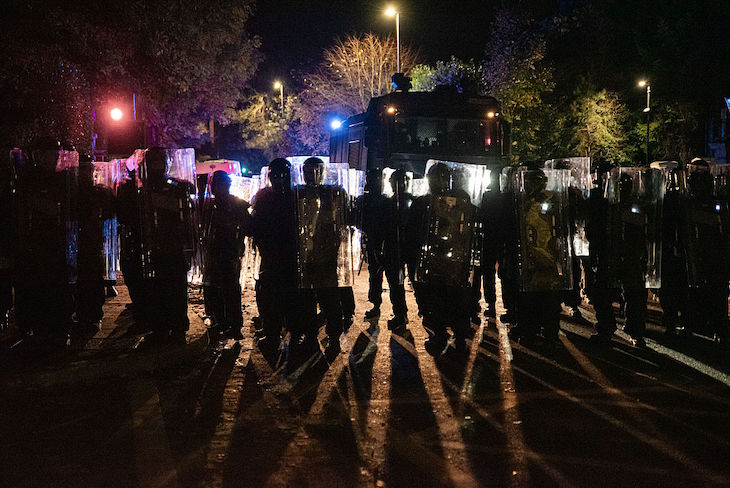Tony Blair spent much of his time as prime minister projecting a persona that most people of a conservative mindset found quite reassuring. But Keir Starmer is no heir to Blair. The New Labour leader removed a commitment to nationalisation from the party’s constitution. He pledged to keep the tax burden under control. And he seemed to put himself on the side of those who were making a success of their lives. Starmer has done none of these things since taking office, alienating Labour voters and making life harder for millions of Brits.
It is hard to see Keir Starmer’s administration finding such a path back to electoral safety
It’s not true, of course, to say that Blair never slipped up. But only once did he really let the mask come off and publicly display a visceral loathing for social and cultural conservatism while presenting himself as a hardline ideological “progressive”. This was during his infamous “Forces of Conservatism” party conference speech 25 years ago.
Here he branded the Tory party “the party of fox hunting, Pinochet and hereditary peers: the uneatable, the unspeakable and the unelectable”. He claimed that an opposition led by William Hague was “Far Right, far out”. In a relentlessly partisan address, he pledged that Labour would be the “new radicals…the progressive force that defeats the forces of conservatism”. These included “the old prejudices where foreign means bad, where multi-culturalism is not something to celebrate but a left-wing conspiracy to destroy their way of life”. He even blamed “the forces of conservatism allied to racism” for the murder of Martin Luther King and the extended imprisonment of Nelson Mandela.
The speech stirred up such a hostile reaction that within days Blair was arguing it had been deliberately misinterpreted. A couple of weeks later he was suggesting that the phrase “forces of conservatism” was always intended to apply to the old-fashioned left as much as the old-fashioned right, citing the anti-reform leaderships of some teaching unions as an example. And via that act of spin he made it back to the safety of his hallowed centre-ground.
It is hard to see Keir Starmer’s administration finding such a path back to electoral safety following its own tribal attacks on the forces of conservatism. The main groups most obviously penalised by the government – pensioners over the winter fuel payment, farmers over inheritance tax and the white-working class over accusations of two-tier justice – are all notorious redoubts of social conservatism. The opening of a dialogue about paying reparations for slavery and the dash to ditch the Chagos Islands have similarly offended those of a traditionalist patriotic mindset.
And it’s not even as though Starmer has ever possessed Blair levels of political capital. Gifted a Blair-size parliamentary majority on ten points less vote share in a much lower turnout contest, his was aptly christened the “loveless landslide”.
Where Blair seemed to own the zeitgeist of Cool Britannia and European integration, Starmer looks like a fag-end defender of a failed old order in the face of a Donald Trump clean sweep in America and the rise of national conservatism across Europe. Many Britons do question whether multi-culturalism is a positive thing.
Were Starmer a Blair-style leader he would regard his challenge as being to dominate the centre-ground as defined by sensible provincial opinion. But he has never been able to do that. His first 18 months as Labour leader were disastrous, coming off the back of his shenanigans as Brexit-blocker in chief. He took a knee for the grifters of Black Lives Matter, threw his lot in with the militant trans movement and appeared to side with the whiney Duke and Duchess of Sussex against the Buckingham Palace of the late, great Queen Elizabeth II. The remnants of the old Blair spin machine got alongside him and wrapped him in the Union Flag just in time for him to benefit from the great unravelling of Boris Johnson. But he made it to Downing Street on the back of who he isn’t, rather than who he is.
As an avowed admirer of the Thatcher method of government – a gritty determination to see through radical change even at the cost of early unpopularity – it is quite possible that Starmer will plough on with his war against the forces of conservatism, or even accelerate it in the face of collapsing poll ratings. After all, he has four years ahead in which to pull Britain further along the progressive arc before the laws of electoral gravity can mount a decisive intervention.
In his speech, Blair said the 20th century had been conservative dominated and set out his ambition that the 21st should be dominated by progressives. That’s not going to happen. It turns out that the forces of conservatism – such as belief in borders, the family, kinship ties, self-reliance and the nation state – were there for a reason: most of the progressive stuff doesn’t actually work.
The key question to which we now await an answer is whether the Conservative party wishes to represent these forces of conservatism once again or prefers to cede them to somebody else.








Comments